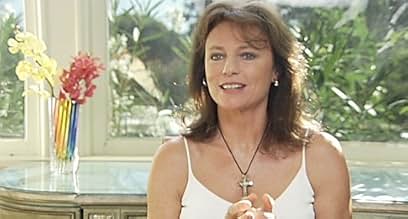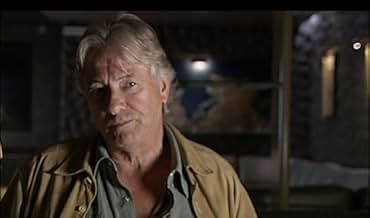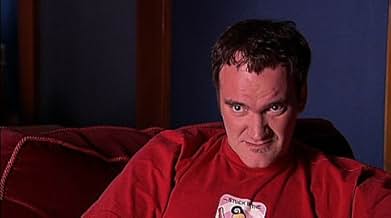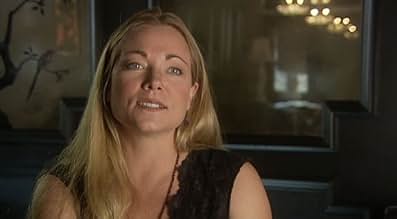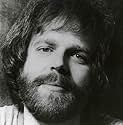Agrega una trama en tu idiomaThe story of Z Channel, one of the first U.S. pay cable stations and its programming chief, Jerry Harvey. Debuting in 1974 in LA, their eclectic slate of movies became a prime example of the... Leer todoThe story of Z Channel, one of the first U.S. pay cable stations and its programming chief, Jerry Harvey. Debuting in 1974 in LA, their eclectic slate of movies became a prime example of the untapped power of cable television.The story of Z Channel, one of the first U.S. pay cable stations and its programming chief, Jerry Harvey. Debuting in 1974 in LA, their eclectic slate of movies became a prime example of the untapped power of cable television.
- Premios
- 1 premio ganado y 1 nominación en total
- Self - Program Director, Z Channel
- (material de archivo)
Opiniones destacadas
The station had among it's subscribers some of the biggest names in Hollywood. What I found fascinating about this film is the power a cable channel can have. For example James Woods credits his Oscar nomination to the Z Channel's constant playing of the little seen movie "Salvador" to the right people.
As a film geek I also enjoyed the generous amount of film clips by director Cassavetes. The film turned me on to movies like "Bad Timing" and "F is for Fake".
James Woods remembers how much he enjoyed working with Oliver Stone on the movie "Salvador" (1986) and he thinks of the role of Richard Boyle, the journalist whose book the films was based on as his best acting achievement. The film was a flop and was pulled from the theaters in two weeks. Jerry Harvey offered to show it on the Z Channel and it ran there for over a month. The next thing, Woods recalls - the movie received two Academy Awards nominations for the Best Actor in a Leading Role for him and for Best Writing, Screenplay Written Directly for the Screen for Stone and Boyle. Woods is sure that it would not have been possible without Z Channel because nobody would see "Salvador".
Thanks to the documentary, I was able to recognize the movie that I saw many years ago in Moscow and still remember well, I could not only recall the title. I remember that the movie was Dutch, very erotic in the raw, brutal, twisted yet beautiful and passionate way. Watching "Z Channel.." last night, I was happy to instantly recognize "Turks fruit" (1973) aka "Turkish Delight" made by Paul Verhoeven in 1973. There are not very many directors in the world that can create the atmosphere of raw sensuality as well as Verhoeven (of his Dutch period, especially). I am going to try to find "Turkish Delight" and see it again.
The film does not hide the dark side of Harvey who with two sisters was raised by the fundamental catholic father in a strict house. One of his sisters has committed suicide and the other vanished (more likely she took her own life, also). Harvey described his childhood as a cross between "American Graffiti" and "Two Lane Blacktop". For many years, Harvey had fought his mental conditions but in the end, he could not cope with the problems, external - pertaining to selling Z Channel to a company that tried to combine films with sports programming and mental that had always been the part of his life. In April 1988 , Harvey shot to death his second wife Deri Rudolf with the gun who was presented to him by his long time friend, Sam Pekinpah. Then, he killed himself.
Controversial and disturbed, fiercely intelligent, madly in love with the films but sadly having lost the battle to the demons of depression, Harvey's will be remembered for bringing to the viewers the films in their "Director's Cut" and the best foreign and independent films.
In the conclusion I want to mention that the movie was made by Alexandra ("Xan") Cassavetes, the daughter of John Cassavetes, the Godfather of American Independent film-making and his muse Gena Rowlands.
Jerry Harvey was a college dropout who intensely loved film and film studies, making him the ideal choice for deciding what films would appear on Z Channel. Various former co-workers, critics, directors and actors, mostly independents, offer their fond memories of a channel that had the power to make or break a film or filmmaker. (Cassavetes includes a story about how one of Hollywood's most infamous film debacles, "Heaven's Gate" ended up being ridiculed because of terrible editing; when Z Channel ran the director's cut it was heralded by the public and critics alike.) The vision that Harvey had for the channel and the output it had is envious even by today's standards. They would have Bergman film festivals, uncut versions of films that had only been seen in their edited format, cult and avant garde films; and directors like Alexander Payne (sporting an old Z Channel t-shirt) and Quentin Tarantino share their memories of having tapes of old Z channel broadcasts.
Unfortunately, personal demons and a family history of psychological issues ended Jerry Harvey's life and the life of his wife when he first killed her then killed himself. This was shortly after the eventual demise of the Z channel itself, which first sold out and shared programming with ESPN, and then was dissolved altogether. Despite its unceremonious demise, Z channel is remembered fondly by those that experienced its programming and were involved in its broadcasting, and is looked upon with reverence by anyone who considers themselves, like Jerry Harvey, a life-long student of film. This is an excellent documentary and really is a must-see for film buffs. 8/10 --Shelly
It's that kind of worship that obviously inspired Directer Xan Cassavetes to make "Z CHANNEL - A Magnificent Obsession". And, through the dozens of interviews included in the film, you can see how a relatively small local cable outlet (it never even reached 100,000 subscribers) could still burn in the memory 15 years after its untimely and much lamented demise. But, the film is also bittersweet, because the main creative force behind the channel during it's 80's heydey, Jerry Harvey, was a hugely tormented man whose own murder-suicide closely paralleled the channel's rapid demise.
As a documentary, Z CHANNEL, is somewhat lacking. I find it daunting to imagine very many viewers who didn't subscribe to the channel to either enjoy the movie, or even figure out exactly why it was made. Even a hardcore partisan like myself found it somewhat lacking in context or in giving a clear, lucid description of exactly WHAT Z CHANNEL was or what they showed. Yes, there are some wonderful interviews with Robert Altman, Vilmos Zsigmond and Quentin Tarantino (who, ironically, lived OUTSIDE its subscription area and could only experience it vicariously through a friend's VHS dubs!) as well as some scattershot clips from various movies that were carried on the station. But, why, for instance, do we never get a sample listing of all the films that played during a particular week or a particular month? And, why do we NEVER see actual FOOTAGE from the channel? (The movie clips are Presented as FILM which is certainly aesthetically pleasing when viewed in a theater but not representative of how they were watched on early 80's TV's). Were there rights issues? Certainly, testimony from Tarantino, Alexander Payne and others proves that people have tapes where excerpts could have been culled from. I still have dozens of recordings if they need it for the DVD! Not even a still frame of the station logo? Odd.
What can't be denied is the passion for movies that breathes in every word that is spoken by the interviewees. Careers were made (James Woods, Theresa Russell) or re-discovered for a new generation (Richard Brooks, Sam Peckinpah) simply because of the fact that an inordinately large percentage of the Hollywood community was hooked up to Z CHANNEL (it even aired movies for Academy Awards Consideration long before screener tapes). Some of the same forces that began to coalesce to crush Z CHANNEL (HBO, Cable & Satellite growth, STUDIO mergers with multi-national corporations) are even more in effect now, so it's impossible to imagine such a network existing again.
Long live Z CHANNEL - at least in the memories of those who knew it.
The biographical portions of the documentary -- Harvey's rise from ultra geek to film aficionado, then exhibitor/promoter, all amidst emotional chaos -- are all very interesting, and also tragic. Even more interesting is the history of how The Z Channel was launched, built, ... and eventually lost.
This documentary presents fascinating stories about movies and filmmakers. Michael Cimino's story is a good example. A good friend of Harvey's, Cimino had earned financial support and a free hand by making the incomparable Best Picture, "The Deer Hunter", and then destroyed his credibility & career by his excesses in filming the underrated Heaven's Gate. Through that time, his life was intertwined with Harvey's, presenting unique perspective on the unfolding events.
Harvey not only knew films, and had exceptional taste; he also had the courage and ingenuity to discover and present films (often 'director's cuts) in relentlessly creative, compelling programming. Excellent and important films that have otherwise been overlooked -- like Bertolucci's '1900' and Cimino's Heaven's Gate -- were shown with success by Harvey. One weekend there might be a Truffaut festival, the next perhaps Spaghetti Westerns or the Marx Brothers. Seemingly no genre was ignored; Harvey trusted his audience to watch with open minds and receptive hearts, to respond to great and quirky films, ...and to spread the word and keep the fledgling channel alive and growing. After his death (portrayed compellingly in interviews within the documentary), the station went into decline -- including the desperate step of incongruently showing sporting events (!) in alongside the great film programming. After all, wasn't that part of HBO's success?! Yikes. So sad.
Yet, the greatest joy of this documentary is neither the biography nor the story of Z -- it is the extraordinary range of film clips from the huge range of programming that the Z Channel broadcast.
The visual quality of the documentary is variable, from great to low-grade. But for me, at least, this technical 'weakness' could not undercut a fascinating tour of movies and a devotee who made his taste count. (Indeed, sometimes the "degraded" video imagery was itself a point of interest and beauty.) With apologies to the pretty good Independent Film Channel and the sometimes delightful Turner Classic Movies, the Z Channel appears far better than any station I have seen. I was oblivious to it at the time, so this film was a revelation to me.
¿Sabías que…?
- TriviaThis film was made only after the financing for another film project, a fiction film, partially collapsed.
- Citas
Alexander Payne: You just never know when you're living in a golden age.
- ConexionesFeatures College (1927)
- Bandas sonorasWhat'll I Do
Performed by William Atherton
Written by Irving Berlin
Courtesy of Paramount Pictures Corporation and Williamson Music
Selecciones populares
Detalles
- Fecha de lanzamiento
- País de origen
- Idioma
- También se conoce como
- Канал Z. Великолепная одержимость
- Locaciones de filmación
- Productoras
- Ver más créditos de la compañía en IMDbPro

